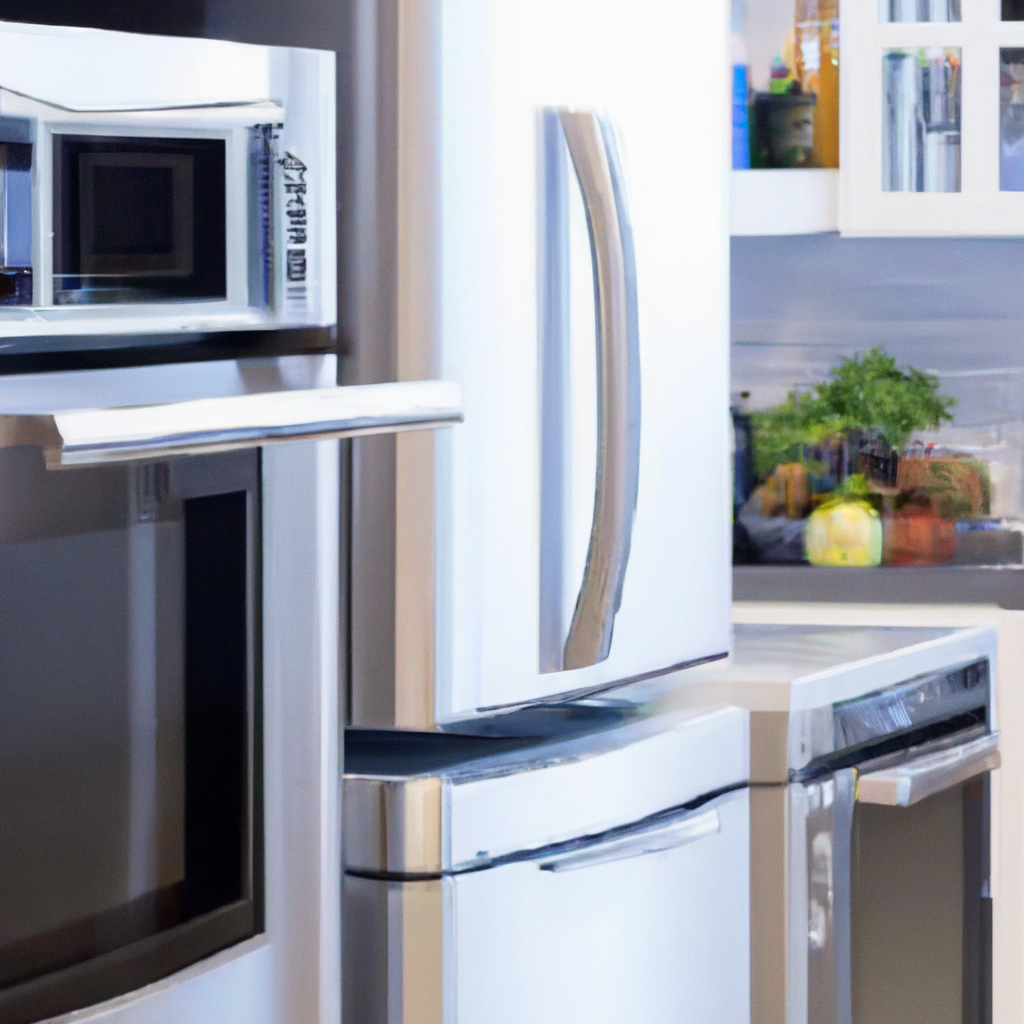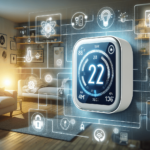Imagine having a kitchen that not only simplifies your daily cooking routines but also helps you reduce your energy consumption. Smart kitchen appliances have emerged as the perfect solution to enhance energy efficiency in our homes. From smart refrigerators that optimize temperature settings to intelligent stovetops that automatically adjust heat levels, these innovative devices are revolutionizing the way we use energy in our kitchens. By enabling us to monitor and control our appliances remotely, smart technology empowers us to make informed decisions that can significantly reduce our energy footprint, all while enjoying the convenience and comfort of a modern kitchen.
Optimizing Usage of Energy
In today’s world, where energy conservation and environmental sustainability are of utmost importance, optimizing the usage of energy in our homes has become a top priority. One area where significant energy savings can be achieved is through the use of smart appliances. These appliances not only make our lives easier, but they also incorporate energy-saving features, smart scheduling, and energy consumption monitoring to help us reduce our energy consumption and lower our carbon footprint.
Smart Appliances and Energy Efficiency
Smart appliances are designed to not only perform their designated tasks efficiently but also to minimize energy wastage. These appliances are equipped with advanced technologies, such as sensors and smart algorithms, that enable them to optimize their energy usage. For example, smart refrigerators have sensors that detect when the door is open for too long and adjust the cooling accordingly, reducing energy waste. Similarly, smart washing machines can detect the size of the load and adjust the water and energy consumption accordingly, saving resources without compromising on performance.
Energy Saving Features
In addition to their overall energy-efficient design, smart appliances come with a host of energy-saving features. These features are designed to minimize energy consumption in various ways. For instance, smart dishwashers have energy-saving modes that reduce water and electricity usage when washing dishes. Smart ovens have features like convection technology and programmable timers that ensure efficient cooking and reduce energy waste. With these energy-saving features, you can enjoy the convenience of modern appliances while also being mindful of your energy usage.
Smart Scheduling
Another key aspect of smart appliances is their ability to utilize smart scheduling. With smart scheduling, you can optimize your appliance usage to align with off-peak electricity hours, when energy prices are lower. By scheduling your appliances to run during these hours, you not only save money on your electricity bills but also contribute to the overall stability of the electric grid. This smart scheduling feature allows you to make the most out of your appliances while reducing your energy consumption during peak hours.
Energy Consumption Monitoring
One of the most significant advantages of smart appliances is their ability to provide real-time energy consumption data. These appliances are equipped with energy monitoring features that allow you to track and monitor your energy usage. By having access to this data, you can gain valuable insights into your energy consumption patterns, identify areas of improvement, and make informed decisions to reduce your energy usage. This level of transparency empowers you to actively participate in energy conservation efforts and be more conscious of your environmental impact.
Efficient Cooking Methods
Cooking is an integral part of our daily lives, and it can consume a significant amount of energy. However, with the advancements in cooking technology, we now have access to efficient cooking methods that can help minimize energy waste in the kitchen.
Induction Cooktops
Induction cooktops are a great example of an energy-efficient cooking method. Unlike traditional gas or electric stoves, induction cooktops use electromagnetic fields to directly heat the cooking vessel. This means that the heat is generated only in the pan or pot, resulting in faster and more efficient cooking. Additionally, induction cooktops offer precise temperature control, allowing you to cook with accuracy and avoid unnecessary energy consumption. With their quick heat-up times and precise controls, induction cooktops are an excellent choice for those seeking energy-efficient cooking solutions.
Energy-smart Ovens
Ovens are often used for baking, roasting, and grilling, and can be a major source of energy consumption in the kitchen. However, energy-smart ovens are designed to reduce energy waste without compromising on performance. These ovens are equipped with features like convection technology, which utilizes a fan to circulate hot air evenly throughout the oven. This results in faster and more uniform cooking, ultimately reducing the cooking time and energy required. Additionally, energy-smart ovens often have programmable timers and preheat functions, allowing you to optimize your cooking process and minimize energy consumption.
Instant Pot Technology
Instant Pots, or multi-cookers, have gained immense popularity in recent years due to their versatility and time-saving capabilities. These appliances combine the functions of a pressure cooker, slow cooker, rice cooker, and more, all in one device. Not only do Instant Pots offer convenience in the kitchen, but they also contribute to energy efficiency. These appliances utilize the power of pressure cooking, which reduces cooking time and energy consumption significantly. By harnessing the high-pressure steam inside the pot, Instant Pots cook food faster and more efficiently, saving both time and energy.

Reducing Standby Power
Standby power, also known as vampire power, refers to the electricity consumed by appliances when they are in standby or idle mode. This may seem insignificant, but when you consider the number of appliances in your home and the cumulative standby power they consume, it can make a noticeable impact on your energy usage. Thankfully, there are smart solutions available to help reduce standby power and promote energy efficiency.
Smart Power Strips
One effective way to tackle standby power is by using smart power strips. These power strips have built-in features that detect when an appliance is not in use and automatically cut off power to those devices. By doing so, smart power strips eliminate standby power consumption and ensure that appliances are not unnecessarily using electricity when not in use. Additionally, some smart power strips even have the ability to prioritize power distribution to essential devices, making them an excellent investment for energy-conscious individuals.
Energy-efficient Standby Modes
In addition to using smart power strips, many appliances now come with energy-efficient standby modes. These modes are designed to minimize the energy consumption of the appliance when it is not actively in use. For example, televisions often have an energy-saving mode that reduces the screen brightness and adjusts other settings to conserve energy. Similarly, computers and laptops have sleep modes that turn off the display and reduce power consumption when the system is idle. By utilizing the standby modes of your appliances, you can significantly reduce standby power and save energy without compromising on convenience.
Minimizing Food Waste
Food waste is a significant issue worldwide, not only in terms of its impact on hunger and food security but also its environmental consequences. When food goes to waste, all the energy that was used in its production, transportation, and storage is also wasted. However, smart kitchen appliances offer solutions for minimizing food waste and promoting sustainable practices in our homes.
Smart Fridges with Inventory Management
Smart fridges equipped with inventory management systems are revolutionizing the way we store and manage our food. These fridges come with built-in cameras and sensors that can scan and recognize the items inside, keeping track of their quantity and expiration dates. With the help of companion smartphone apps, you can easily check the contents of your fridge while at the grocery store or plan meals based on what needs to be used before it spoils. This not only reduces the chances of food wastage but also allows you to maximize the use of ingredients and save money by avoiding unnecessary purchases.
Recipe Suggestions and Meal Planning
Smart appliances can also assist in minimizing food waste by providing recipe suggestions and meal planning features. By inputting the ingredients you have on hand, smart appliances can suggest recipes that utilize those ingredients, helping you make the most out of your food and reduce waste. Additionally, some appliances can assist in meal planning by recommending portion sizes and suggesting combinations to avoid overbuying or overcooking. By utilizing these features, you can optimize your meal preparation, minimize food waste, and save both money and resources.
Smart Food Storage
Proper food storage is essential in preventing food spoilage and waste. Smart food storage solutions, such as vacuum sealers and smart containers, can help extend the shelf life of perishable items. Vacuum sealers remove air from food packaging, reducing the chances of bacterial growth and maintaining freshness for an extended period. Smart containers utilize technology to monitor temperature and humidity levels inside, ensuring optimal conditions for food preservation. By investing in these smart storage solutions, you can significantly reduce food waste and contribute to a more sustainable kitchen environment.

Efficient Water Usage
Water is a precious resource, and it is essential to use it wisely in our daily lives. Smart kitchen appliances offer innovative features that can help minimize water wastage and promote efficient water usage.
Smart Dishwashers
Dishwashers are a common appliance in most kitchens, and they can consume a significant amount of water during the cleaning process. However, smart dishwashers come with water-saving features that help minimize water usage without compromising performance. These features include adjustable water pressure, optimized spray patterns, and sensors that detect the level of dirtiness and adjust the water usage accordingly. By using a smart dishwasher, you can ensure that your dishes are effectively cleaned while conserving water at the same time.
Water-saving Features
In addition to smart dishwashers, many other smart appliances incorporate water-saving features into their design. For example, smart faucets often have sensors that detect when hands are under the tap and automatically turn off the water when not in use. Additionally, some smart refrigerators are equipped with water dispensers that can measure and dispense the exact amount of water needed, reducing unnecessary wastage. These small but significant features contribute to efficient water usage in the kitchen and help us make a positive impact on our environment.
Optimal Lighting
Proper lighting is crucial in any kitchen, and it plays a significant role in both aesthetics and functionality. However, traditional lighting methods can be wasteful and inefficient. With the introduction of smart lighting solutions, we now have the means to optimize our lighting usage and achieve energy efficiency in the kitchen.
Smart Lighting with Motion Sensors
Smart lighting systems equipped with motion sensors are a game-changer when it comes to energy-efficient lighting. These systems can detect when someone enters or leaves a room and automatically adjust the lighting accordingly. For example, in the kitchen, when you enter, the lights will turn on, and when you leave, they will turn off after a certain period of inactivity. This eliminates the need for manual control and ensures that lights are only on when needed, avoiding unnecessary energy consumption.
Lighting Automation
In addition to motion sensors, smart lighting systems also offer advanced automation features. With lighting automation, you can program your lights to turn on and off at specific times or in response to certain events. For example, you can set your kitchen lights to turn on automatically when it gets dark outside or to turn off when you leave the house. By utilizing these automation features, you can optimize your lighting usage, reduce energy waste, and create a more comfortable and efficient kitchen environment.

Remote Control and Monitoring
Smart kitchen appliances go beyond their energy-saving capabilities by offering remote control and monitoring features. These features allow you to actively manage and control your appliances even when you are not at home, providing convenience and peace of mind.
Smartphone Integration
Many smart appliances can be connected to your smartphone or tablet, allowing you to control and monitor them remotely. With a dedicated smartphone app, you can adjust settings, monitor energy consumption, and receive notifications regarding the status and operation of your appliances. For example, you can turn on your smart oven to preheat while on your way home or receive alerts if your smart fridge detects an issue with the temperature. These remote control and monitoring features enable you to actively manage your appliances and ensure that they are operating efficiently, even from afar.
Energy Tracking Apps
In addition to the dedicated smartphone apps provided by individual appliances, there are also energy tracking apps available that can help you monitor your overall energy usage. These apps allow you to track and analyze your energy consumption patterns, set energy-saving goals, and receive personalized recommendations on how to reduce your energy usage. By utilizing energy tracking apps, you can gain a comprehensive understanding of your energy consumption and make informed decisions to further optimize your energy usage in the kitchen and throughout your home.
Energy Efficiency Labels and Standards
When choosing new appliances for your kitchen, it is essential to look for energy efficiency labels and certifications. These labels and standards provide valuable information about the energy performance of the appliance, allowing you to make informed decisions and choose appliances that will help you achieve energy efficiency.
ENERGY STAR Certification
The ENERGY STAR certification is a widely recognized symbol of energy efficiency. Appliances that bear the ENERGY STAR label have met strict energy efficiency criteria set by the Environmental Protection Agency (EPA). These appliances are designed to use less energy and reduce greenhouse gas emissions without sacrificing performance or features. When shopping for appliances, look for the ENERGY STAR label to identify products that will help you save energy and lower your utility bills.
European Union Energy Labeling
In the European Union, appliances are required to have energy labels that provide information on their energy efficiency. These labels use a standardized ranking system, with the highest energy efficiency class being labeled as A+++ and the lowest as D. By checking the energy label on an appliance, you can easily assess its energy efficiency and make an informed choice.
Other Standards and Labels
In addition to ENERGY STAR and European Union labels, there are various other standards and labels around the world that indicate energy efficiency. These include labels such as EnerGuide in Canada, Energy Rating Label in Australia, and the China Energy Label. Familiarize yourself with the energy efficiency standards and labels in your country to ensure that you are selecting appliances that meet the required energy-saving criteria.

Integration with Renewable Energy Sources
To further enhance energy efficiency, smart kitchen appliances can be integrated with renewable energy sources such as solar power and connected to the smart grid system in your area.
Smart Appliances and Solar Power
By connecting smart appliances to a solar power system, you can effectively utilize clean and renewable energy to power your kitchen. Solar panels installed on your roof generate electricity from the sun’s energy, which can then be used to power your appliances. By utilizing solar power, you can reduce your reliance on the grid and lower your carbon footprint. Additionally, smart appliances can be programmed to optimize energy usage based on the availability of sunlight, ensuring that you make the most out of your solar power system.
Smart Grid Integration
Smart grid systems are being implemented in many countries to modernize the electrical grid and improve its efficiency. By connecting your smart appliances to the smart grid, you can take advantage of demand-response programs and flexible electricity pricing. Demand-response programs allow the grid to communicate with your appliances, temporarily adjusting their energy consumption during peak demand periods or when renewable energy is abundant. This helps to balance the grid and reduce the strain on the electrical infrastructure. By participating in these programs, you can actively contribute to the stability of the grid and promote overall energy efficiency.
Consumer Benefits and Cost Savings
Investing in smart kitchen appliances and adopting energy-efficient practices not only benefits the environment but also provides numerous advantages to consumers.
Lower Energy Bills
By using energy-efficient appliances and implementing energy-saving practices, you can significantly reduce your energy consumption and, ultimately, lower your energy bills. Energy-efficient appliances are designed to consume less energy without compromising performance, allowing you to enjoy the same level of convenience while saving money in the long run. Additionally, by being more mindful of your energy usage and implementing smart scheduling and standby power reduction strategies, you can further reduce your energy bills and keep more money in your pocket.
Reduced Environmental Impact
One of the most significant benefits of energy efficiency is its positive impact on the environment. By reducing your energy consumption, you contribute to the overall conservation of natural resources and the reduction of greenhouse gas emissions. By utilizing smart kitchen appliances and adopting energy-efficient practices, you can make a tangible difference in the fight against climate change and promote a more sustainable future for generations to come.
In conclusion, smart kitchen appliances have the potential to contribute significantly to energy efficiency. From energy-saving features to efficient cooking methods, reducing standby power, minimizing food waste, optimizing water usage, and enhancing lighting efficiency, smart appliances offer a range of innovative solutions for energy-conscious individuals. By integrating with renewable energy sources, adopting remote control and monitoring features, and considering energy efficiency labels and standards, you can further enhance the energy-saving capabilities of your kitchen. With the numerous consumer benefits and cost savings associated with energy efficiency, it is clear that smart kitchen appliances are not only practical but also environmentally friendly choices for any modern home. Embrace the power of smart appliances and join the movement towards a more energy-efficient future.











